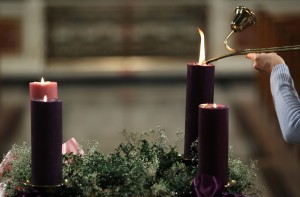

Has the "War on Christmas" already been lost -- in your heart?
Kris Dmytrenko
Tuesday, December 14, 2010
 Soon, we were able to extract the root problem: she wasn’t feeling very enthusiastic about it herself. I had to confess that I felt the same way. And who could blame us? Like Santa’s sleigh, the season has accumulated some serious baggage.
Soon, we were able to extract the root problem: she wasn’t feeling very enthusiastic about it herself. I had to confess that I felt the same way. And who could blame us? Like Santa’s sleigh, the season has accumulated some serious baggage.
Read the Scriptures. Sleep late next year on Black Friday. Refrain from buying stuff that no one needs. Tell everyone else not to buy you so much stuff. Spend less. Turn off QVC and turn on a CD of Christmas hymns. Don't even open those emails from J. Crew and Eddie Bauer and L.L. Bean. Send cards not to 100 people, but 10. Pray more. Buy fewer gifts for fewer people. Set a limit on visiting department stores. Remember that Macy's can't tell you what to believe in. Cut back on the holiday parties. Stop eating so many cookies. Don't get sucked into the craziness. In short, resist, ignore or avoid the superfluous stuff that has little to do with Christmas.It’s a good start. Thankfully, the Advent calendar shows that we still have 11 days left to put some of Fr. Martin’s recommendations into practice. Like every clichéd holiday film, there’s hope for even the most cynical and wearied among us to rediscover the true spirit of Christmas.
Related Articles:
Category: General Posts
Tag: Advent, Christmas, Christmas ads, Christmas Wal-Mart, Christmas Walmart, gift giving, giving, Merry Christmas, Wal-Mart Christmas, Walmart Christmas, War on Christmas
Pray with the Pope Reflection – July 2025
Friday, July 11, 2025
 Fr. Edmund Lo, SJ
Fr. Edmund Lo, SJ
The Holy Father invites us to pray that we might again learn how to discern, to know how to choose paths of life and reject everything that leads us away from Christ and the Gospel.
Pray with the Pope Reflection – June 2025
Friday, June 13, 2025
 Fr. Edmund Lo, SJ
Fr. Edmund Lo, SJ
In this month of June, the Holy Father invites us to pray that the world might grow in compassion, that each one of us might find consolation in a personal relationship with Jesus, and from his Heart, learn to have compassion on the world.
Chaplaincy: “Divine Coffee” for Students
Tuesday, June 10, 2025
 Gianpaolo Capozzi
Gianpaolo Capozzi
Gianpaolo gives us a behind the scenes look at his upcoming Behold segment on the York University Catholic Chaplaincy.
Pope Leo XIV’s homily for Pentecost Sunday 2025
Sunday, June 8, 2025
 Pope Leo XIV
Pope Leo XIV
On Sunday, June 8, 2025, Pope Leo XIV celebrated Mass for the Jubilee of Movements, Associations, and New Communities and spoke about how the Holy Spirit helps the apostles overcome "their fear, shatters their inner chains, heals their wounds, anoints them with strength and grants them the courage to go out to all and to proclaim God’s mighty works."
Homily of Pope Leo XIV at the Mass for the Jubilee of Families, Children, Grandparents, and the Elderly
Sunday, June 1, 2025
 Pope Leo XIV
Pope Leo XIV
Pope Leo XIV celebrated Mass for the Jubilee of Families, Children, Grandparents, and the Elderly and referred to Pope Francis and mentioned spouses who have been beatified and canonized, like the parents of St. Therese of the Child Jesus.
SUPPORT LABEL
$50
$100
$150
$250
OTHER AMOUNT
DONATE










